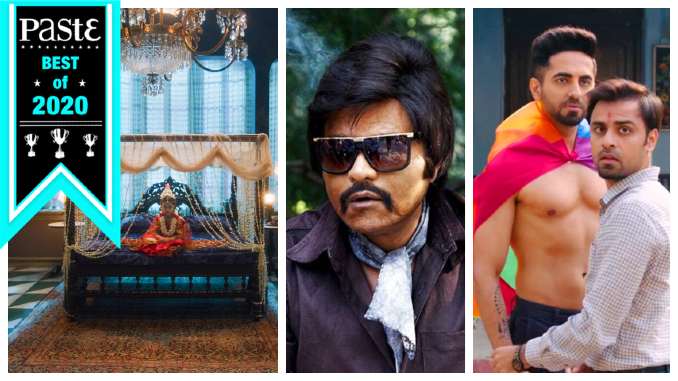Entertainment industries around the globe found themselves having to negotiate new realities in 2020. Bollywood (and the best Bollywood movies of 2020) was no different. The year started strong, with several high profile projects making it to movie theaters and receiving critical acclaim as well as box office success. However, as the pandemic rolled around and theaters shuttered, some blockbuster-style films ended up holding off theatrical releases altogether (such as the much anticipated Sooryavanshi and ’83—now slated for 2021 releases) while others went the streaming route. Despite the strangeness of 2020, here are 10 Hindi-language films, in no particular order, from this year worth adding to your watchlist—if you haven’t seen them already, that is.
Here are our picks for the 10 best Bollywood movies of 2020:
1. Shubh Mangal Zyada Saavdhan


Expectations were high for this film written and directed by Hitesh Kewalya, starring Ayushmann Khurrana, Jitendra Kumar, Neena Gupta and Gajraj Rao. Kewalya had written Shubh Mangal Saavdhaan (2017), which also starred Khurrana opposite Bhumi Pednekar, and looked at the constructs of masculinity and female sexuality while delivering the laughs expected of a rom-com. In Shubh Mangal Zyada Saavdhan, the issue at the heart of the rom-com is a gay couple trying to get the acceptance of their family. Kumar plays Aman Tripathi, a man originally from not-so-small town Allahabad who lives with his lover Kartik Singh (Khurrana) in New Delhi. When Aman’s conservative parents fix his wedding with a family friend’s daughter, Kartik joins Aman on the trip home. In trying to reflect traditional-minded attitudes towards homosexuality, some of the scenes played up for laughs can be regressive, but the strength of the film is in its actors, particularly Kumar. You can’t help but connect with his conundrum, stuck between his parents and his lover.
2. Chhapaak


Directed by Meghna Gulzar and starring Deepika Padukone in the lead role, Chhapaak centers around the story of acid attack survivor Malti Lal. The film is based on the real life story of Laxmi Agarwal, who was 15 when her face was splashed with acid by Naeem Khan (a 32-year-old family friend) because Agarwal had refused Khan’s several advances. Agarwal fought for a new law seeking harsher penalties for acid attack perpetrators and the ban of over-the-counter acids. Chhapaak is powerful in the way it manages to humanize Malti’s story, the camera’s unflinching gaze trained on her disfigured face. Also compelling are activist Amol Dwivedi (Vikrant Massey) and tenacious lawyer Archana Bajaj (Madhurjeet Sarghi).
3. Panga


These days Bollywood star Kangana Ranaut is known more for her Twitter inanities, though occasionally, she does a film that reminds us that she can also be a fine actress. Panga tells the story of Jaya Nigam, a former pro kabaddi player who had to give up her love for the game when she got married and became pregnant. (Kabaddi is a style of Indian sport that’s a combination of tag and wrestling—and that doesn’t even begin to describe it.) Tired of her desk job, and cheered on by her supportive husband Prashant Sachdeva (Jassi Gill) and precocious son Aditya (Yagya Bhasin), Jaya starts dreaming of becoming a champion again. “Can’t Mummy make a comeback at 32?” asks Aditya. “Serena Williams did.” Although Jaya starts training again, she finds that her biggest challenge is believing in herself. You know how the movie will end, but Panga is still a solid family watch.
4. Thappad


Can a husband slapping his wife once be grounds for a divorce? While exploring this question, Thappad manages to look at the many ways in which women negotiate their roles as wives, mothers or friends. Amrita Sabharwal (Taapsee Pannu) is happily married to Vikram Sabharwal (Pavail Gulati), an executive who is angling for a promotion at his firm. During a party at their house meant to celebrate his success, Vikram finds out that he’s been passed over for the promotion, and gets into an argument. When Amrita tries to intervene, Vikram slaps her in front of everyone. Stunned, Amrita starts to reassess her life, as family and friends counsel her with differing advice. Although the movie is filled with solid performances, it’s the small moments between characters that stay with you: A domestic worker wondering that even her employer can face domestic abuse; Amrita’s parents’ discussion on the ambitions that Amrita’s mother had to give up; the quiet dignity with which family friend Shivani Fonseca (Dia Mirza) says that she won’t lie, especially in front of her teenage daughter. Thappad’s message resounds loudly even after the credits roll.
5. Kaamyaab


The premise of Kaamyaab is fantastic. What happens to the many supporting actors past their prime who were once central to Bollywood masala movies? Sudheer (Sanjay Mishra) is a retired actor who starred in the golden age of Bollywood cinema, back when sideburns were thick and the dialogues full of schlocky catchphrases. Now Sudheer lives in a modest apartment, alienated from his daughter, his glory days long forgotten. During an interview about veteran actors, Sudheer realizes that his name has appeared in 499 films. Suddenly he’s invigorated with a new mission: Act in one last role that will give him the unique distinction of starring in 500 films. Veteran character actor Mishra is brilliant as Sudheer and is ably assisted in this indie film by many talented supporting actors.
6. Gulabo Sitabo


The true pleasure of Gulabo Sitabo lies in its language. This film is writer Juhi Chaturvedi’s love note to her former hometown of Lucknow, and is capably directed by her longtime collaborator Shoojit Sircar. The story revolves around a crumbling mansion called Fatima Mahal in Lucknow, a city once known for its splendor and genteel culture. Fatima Mahal is named for the elderly Fatima Begum (Farrukh Jaffar), whose not-so-young husband Chunnan “Mirza” Nawab (Amitabh Bachchan) is waiting for her death so that he can inherit the mansion. Meanwhile Mirza goes around stealing knick-knacks from the mansion and the many renters who live in the sprawling grounds, and getting into bickering matches with particularly irate renter Baankey Rastogi (Ayushmann Khurrana). A government archaeological agency and lawyers get involved. The bickering gets more complicated. There is a message in the film, if you really want to look for it, but really, watching Gulabo Sitabo is like watching two old rivals go at it again, smiling at the small digs and the game of one-upmanship between them. The strong female characters who also figure into this tale just add to the general delights.
7. Bulbbul


Part period piece, part feminist storytelling—Bulbbul is a powerful film in both aspects. The addition of South Asian/Bengali gothic horror is icing on this bonbon. (The film is a taut 90 minutes long, which is where many Bollywood films typically break for intermission.) The story centers on Bulbbul (Tripti Damri), a child bride in 19th century Bengal Presidency. Married to a much older landlord, Indranil (Rahul Bose), Bulbbul befriends her husband’s youngest brother Satya (Avinash Tiwary). Sensing the growing bond between Bulbbul and Satya over the years, Indranil sends Satya to London to study law. By the time Satya returns, he finds his former playmate changed into the mysterious lady of the house, and a bloodthirsty chudail (witch-like figure) preying on villagers. No prizes for guessing who the chudail is. The beauty—and horror—of Bulbbul is in the small details that fill the story and its cinematic aesthetics.
8. Raat Akeli Hai


The reason to watch this film is the return of Nawazuddin Siddiqui in the role of a tenacious police officer. Raat Akeli Hai is a murder mystery set in Kanpur, a small-ish town in northern India. Jatil Yadav (Siddiqui) is called to the scene when rich patrician Raghuveer Singh is found shot dead on the day of his wedding to the much younger Radha (Radhika Apte)—known to be Raghuveer’s kept woman. Although Raghuveer’s family wants the case wrapped up quickly, Jatil senses there are many secrets hiding in the Singh mansion. Despite facing opposition from his seniors and his junior colleague, as well as the constant nagging by his mother (Ila Arun, in a delightful role), Jatil doggedly follows the clues. Despite a couple of contrivances—especially the ending—Raat Akeli Hai is a compelling watch.
9. Gunjan Saxena: The Kargil Girl


This biopic is based on the life of Gunjan Saxena, an Indian Air Force pilot and one of the few women in a male-dominated defense service. Born into a military family, she joined the Indian Air Force in 1996 and was the only woman who took part in the combat mission during India’s 1999 Kargil War. Bollywood starlet Jahnvi Kapoor plays the title role credibly and is wonderfully supported by many men, including Pankaj Tripathi (one of the current go-to actors to play benevolent and quirky dad figures) as her encouraging father Anup Saxena and Angad Bedi as her discouraging brother Anshuman. Gunjan doesn’t have many female allies in the film, but that just underscores the everyday sexism and casual misogyny women face in day to day life. At the end of it, Gunjan does achieve her childhood dream to become a pilot, a wonderful vision for any woman—young or old—looking to spread her wings.
10. Sir


To say that Sir is an unusual love story is an understatement. In fact, given the strict class structure and boundaries of Indian society, it’s an unlikely love story. The beauty of Rohena Gera’s quiet film, then, is that Sir makes you believe that a romance between the upper-class Ashwin (Vivek Gomber) and Ratna (Tillotama Shome), his maidservant—which is how people refer to domestic workers in India—is possible. Ratna is a young widow from a small village, who comes to Mumbai looking for work and, possibly, fulfilling her dreams of becoming a fashion designer. Ashwin is a writer who has returned to Mumbai from New York, after the death of his brother, to help run the family business. He becomes even more of a loner after his engagement to his fiancée falls through. At first, Ratna is a shadowy figure in Ashwin’s life, always in the background. But slowly, as Ashwin starts to understand Ratna’s ambitions, and Ratna starts to accept Ashwin’s camaraderie, a deeper relationship builds between them. Will it last? Sir doesn’t offer any answers. However, the possibility is sublime.
Aparita Bhandari is an arts and life reporter in Toronto. Her areas of interest and expertise lie in the intersections of gender, culture and ethnicity. She is the producer and co-host of the Hindi language podcast, KhabardaarPodcast.com. You can find her on Twitter. Along with Bollywood, Toblerone bars are one of her guilty pleasures.









